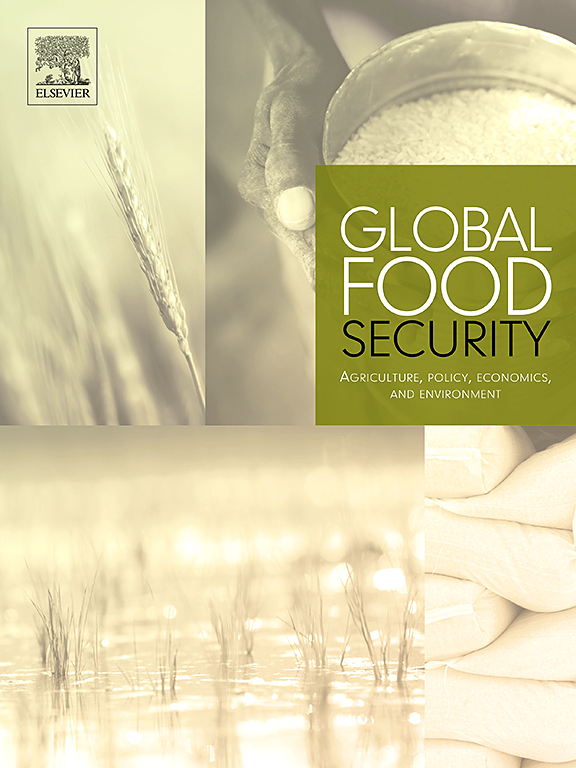撒哈拉以南非洲的储蓄工具与粮食安全:以马里小农为例
IF 9.6
1区 经济学
Q1 FOOD SCIENCE & TECHNOLOGY
Global Food Security-Agriculture Policy Economics and Environment
Pub Date : 2025-03-28
DOI:10.1016/j.gfs.2025.100847
引用次数: 0
摘要
粮食安全是马里和整个撒哈拉以南非洲地区高度关注的问题。然而,现有政策主要针对卫生和农业部门,忽视了金融部门发展的潜在利益。我们的目标是通过一个案例研究来填补这一空白,该案例研究依赖于收集到的马里小农的储蓄和粮食安全数据。通过使用普通最小二乘模型和工具变量方法,我们分析了农民储蓄工具与粮食安全之间的关系。我们重点研究了四种不同的储蓄工具,包括正式机制,如银行账户,半正式机制,如移动货币,以及非正式机制,如在秘密的藏身之处存钱,并与可信任的人一起存钱。这四种工具在马里和整个撒哈拉以南非洲地区很常见。调查结果揭示了储蓄工具和金额的选择与粮食安全的异质性。我们的贡献旨在为决策者提供金融和农业联系政策设计方面的信息,这对于解决小农的脆弱性至关重要。由于马里严重的营养状况预示着一个受危机影响的地区,我们的研究结果可能也适用于撒哈拉以南非洲的其他国家。本文章由计算机程序翻译,如有差异,请以英文原文为准。
Saving instruments and food security in Sub-Saharan Africa: A case study of smallholder farmers in Mali
Food security is of high concern in Mali and throughout Sub-Saharan Africa. Nonetheless, existing policies primarily target the health and agricultural sectors, overlooking potential benefits of financial sector development. We aim to fill this gap through a case study, relying on primary collected saving and food security data from smallholder farmers in Mali. By using ordinary least square models as well as an instrumental variable approach, we analyze the associations between farmers’ saving instruments and food security. We focus on four different saving instruments, including formal mechanisms such as bank accounts, semi-formal mechanisms such as mobile money, and informal mechanisms such as saving in secret hiding places, and with a trusted person. These four instruments are common in Mali and across Sub-Saharan Africa. The findings reveal heterogeneity in the choice of saving instruments and amounts and food security. Our contribution aims to inform decision makers on designing policies at the nexus of finance and agriculture, which is crucial for addressing the vulnerability of smallholder farmers. Since the severe nutritional situation in Mali is indicative of a crisis-affected region, our findings might be applicable to other countries in Sub-Saharan Africa as well.
求助全文
通过发布文献求助,成功后即可免费获取论文全文。
去求助
来源期刊

Global Food Security-Agriculture Policy Economics and Environment
FOOD SCIENCE & TECHNOLOGY-
CiteScore
20.90
自引率
3.40%
发文量
69
期刊介绍:
Global Food Security plays a vital role in addressing food security challenges from local to global levels. To secure food systems, it emphasizes multifaceted actions considering technological, biophysical, institutional, economic, social, and political factors. The goal is to foster food systems that meet nutritional needs, preserve the environment, support livelihoods, tackle climate change, and diminish inequalities. This journal serves as a platform for researchers, policymakers, and practitioners to access and engage with recent, diverse research and perspectives on achieving sustainable food security globally. It aspires to be an internationally recognized resource presenting cutting-edge insights in an accessible manner to a broad audience.
 求助内容:
求助内容: 应助结果提醒方式:
应助结果提醒方式:


